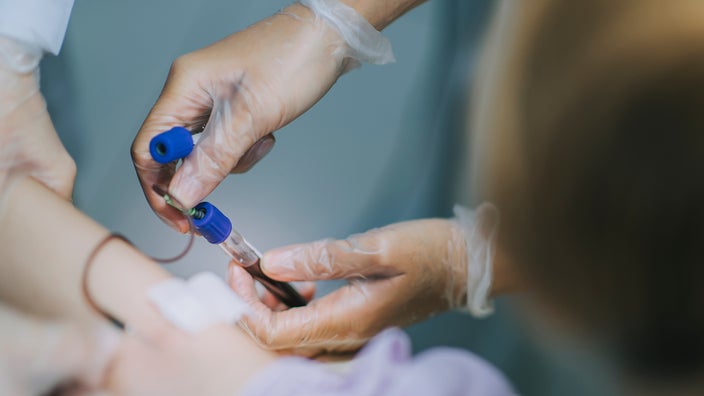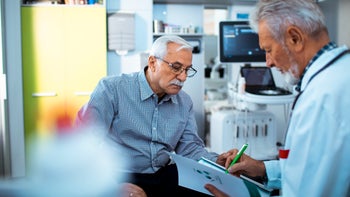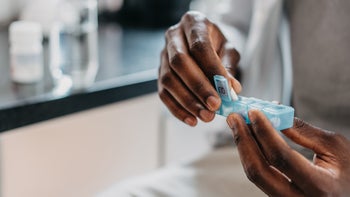
Can a Blood Test Detect Cancer?
Key takeaways:
A diagnosis of cancer often involves blood tests. But blood tests alone can’t detect cancer in a healthy person — yet.
Multi-cancer early detection (MCED) tests are a new type of blood test. They promise to find cancer early, before it causes any symptoms.
Although MCED tests will offer strong benefits in the future, these tests come with tricky questions about when and how they should be used.
Table of contents

Cancer is never good news. But catching it early — before it has a chance to cause major problems — can mean the difference between a bad diagnosis and a worse one.
Researchers are working to develop a single blood test that can look for many types of cancer at once during a routine checkup. The goal of these multi-cancer early detection (MCED) tests is to find cancer in an early stage. Catching a cancer early often means that treatment is simpler and survival more likely.
As great as this sounds, the ability to easily screen for all kinds of cancer with one simple test comes with some problems. Here’s where the science is at the moment.
Which types of cancers can already be diagnosed with a blood test?
There are no routine blood tests that can reliably detect cancer in people who don’t know they have cancer. As John Strickler, MD, associate professor at Duke University, told us, “Some cancers can be detected in routine blood work, but these tests can also report a cancer present when it is not, or report no cancer when it is there.”
Currently, blood work is mostly only helpful to confirm a cancer you already know is there — or to track how a diagnosed cancer is responding to treatment. These types of blood tests are called “tumor markers.”
Testing blood for tumor markers
Blood tests for tumor markers measure levels of cancer-related substances in the blood. They are helpful for watching the effects of treatment for a known cancer.
Tumor markers that can be measured include:
CA-125 for ovarian cancer
Carcinoembryonic antigen (CEA) for colorectal cancer
CA19-9 for pancreatic cancer
What about blood tests to screen for cancer?
For most types of cancer, there aren’t good screening blood tests. Sometimes, a cancer can be picked up during a routine checkup or physical exam. But, most of the time, the start of symptoms is what leads to a diagnosis.
As of right now, there’s only one blood test that’s commonly used to screen for cancer in healthy people — the prostate-specific antigen (PSA) test. This test looks for prostate cancer, but even this helpful blood test isn't perfect. Many things can change your PSA level, so providers have to rely on other tools as well.
Why can’t current blood tests detect all kinds of cancer?
Until recently, technology hasn’t been available to screen for all of the different types of cancer using a single blood test. Here are some of the reasons:
There are thousands of different types of cancer, and the different types don’t have much in common with each other.
Cancer cells are very similar to healthy cells. So a screening test for cancer needs to be incredibly precise to tell the difference.
A blood sample contains many different types of cells, parts of cells, and molecules. Most of these are “normal” — even in a person who has cancer. Detecting an early sign of cancer in a healthy person is like looking for a needle in a haystack.
Cancer workups are expensive, invasive, and stressful. Screening tests that aren’t extremely accurate can cause more problems than they solve.
But there’s some promising news. According to Dr. Strickler, “There’s emerging technology that can detect multiple types of cancer with one routine blood test.”
How can new technology be used to detect cancer on a blood test?
A variety of new technologies are opening doors for MCED tests. These tests look for biomarkers that are linked to certain cancers. Put another way, the tests pick up specific cancer molecules in the blood.
One type of MCED test that seems especially promising looks for cancer-related genetic material (DNA or RNA) circulating in the bloodstream. This works because cells in the body release genetic material when they naturally die. This genetic material is washed into the bloodstream, where it can be picked up on a blood test.
Researchers have identified certain genetic sequences that are common in different types of cancer. Using specialized equipment, they can scan the DNA or RNA in a blood sample to see if any of these cancer-linked genetic patterns are present. If they are, that could be a sign that cancer cells are growing somewhere in the body.
DNA that’s circulating in the bloodstream is called “cell-free DNA” (cfDNA).
Are cfDNA blood tests for cancer available now?
If you’re already being treated for cancer, your medical team might use this type of testing to tell if your cancer is completely gone after treatment. This is possible because tests can be designed to look for the DNA sequences of your specific cancer. This type of testing is part of minimal residual disease (MRD) testing.
Scientists are developing similar tests to screen healthy people for just one specific type of cancer. In some cases, these tests combine cfDNA technology with other biomarker information. IMMray, which is used to detect pancreatic cancer, is one example of this type of test.
What about blood tests to find different types of cancer in healthy people (MCED tests)?
Searching for multiple cancers in healthy people is trickier because there are so many types of cancer to consider. If you’re healthy and have no symptoms, the best cancer-screening test will need to search for many types of cancer and tell you if you have any of them (or none at all).
Over the last few years, researchers have studied these MCED tests:
There are no FDA-approved multi-cancer early detection tests available yet. But cfDNA technology holds promise for this sort of screening in the near future.
Are blood tests for cancer accurate?
Research on MCED tests shows that they’re already very good at finding cancer. And they’re getting better all the time.
Laboratory technology to detect biomarkers — including cfDNA — is becoming more widely available. At the same time, there’s growing knowledge about cancer-related molecules and genetic sequences. And that allows researchers to expand the search for more types of cancer. Technology to collect and process large amounts of genetic data is improving, too.
The result is that blood tests for cancer show fantastic promise for the future, but they aren’t quite ready to be used regularly yet. It’s important to note that they aren’t ready to take the place of other cancer-screening procedures.
Who should get a blood test for cancer?
Right now, MCED tests are not routinely recommended for anyone. This is because the technology is too new to be reliable. Plus, the potential for wrong results can lead to confusion, stress, and unnecessary tests or treatment. The tests are also extremely expensive, and they’re not readily available.
What are the downsides of using a blood test to look for cancer?
Blood tests for cancer might sound like a great tool, but researchers are still working to understand their limitations. If you choose to use a blood test to look for cancer, you’ll want to be prepared for the results. There are issues with both positive and negative results. Let’s take a closer look.
Negative results can be misleading
Most cfDNA testing can only look for cancers that share identified genetic patterns. Some technologies try to avoid this problem through machine learning and other methods. But with so many different types of cancers out there, it’s likely there will always be some cancers that get missed.
So, regardless of your results, you’ll need to continue with regular cancer screenings just as you did before.
Plus, tests to detect cfDNA rely on cancer cells dying and releasing their genetic material into the bloodstream. This doesn’t happen at the same rate for all cancers. And it’s always possible that a single blood sample could miss some telltale information. Experts don’t know yet how large of a blood sample is needed to make the results trustworthy. They also don't know how often screening tests should be done to make them worthwhile.
Positive results can cause problems, too
Consider this scenario: You’re feeling fine, but then a routine blood test shows cancer. It can be hard to know what to do with that information.
Plus, it turns out that cancer-like cells often appear and disappear in healthy people without causing problems. If those normal cells trigger a positive result on a cancer screening test, that could lead to expensive or invasive testing that you don’t need.
To make matters worse, technology to identify cfDNA has the potential to be extremely sensitive. This means that it can detect a particular pattern of DNA when only a tiny fragment is present. While this seems like a good thing, it also causes problems. A highly sensitive test increases the chance of a result saying you have cancer — even when you don’t.
Will there be better blood tests for cancer in the future?
Yes, better tests for detecting cancer are on the horizon. According to Dr. Strickler, “This technology is rapidly evolving, and as the accuracy improves, it’s expected that this type of blood test will be part of standard preventive health screening in the future.”
In fact, the technology to find cancer biomarkers like cfDNA in a blood sample exists today. That’s exciting news. Now the challenge is to find a way to make these tests work for everyone.
The hope is that a single blood test to check for cancer will be part of regular preventive care in the future.
Best ways to screen for cancer
Even though we don’t yet have reliable blood test technology to screen healthy people for cancer, there are other screening tests that do just that.
In fact, testing healthy people for cancer is already part of regular preventive care. The U.S. Preventive Services Task Force recommends regular screening tests for several different types of cancer, including:
Mammograms to screen for breast cancer
Colonoscopies, sigmoidoscopies, CT colonography, or stool testing to screen for colon cancer
Pap smears to screen for cervical cancer
Low-dose computed tomography to screen for lung cancer
These tests can be uncomfortable, invasive, and expensive. So many people don’t do them. It’s a good idea to speak with your primary care provider every decade to make sure you are up to date with recommended cancer screenings for your stage of life and your individual risk factors.
The bottom line
Catching cancer early can make a big difference when it comes to treatment and survival. New blood tests promise to detect cancer in its earliest stages — before it causes any symptoms. Although these tests will have major benefits, they also raise difficult questions about who should be screened for cancer and when as well as what should be done when traces of cancer are found unexpectedly.
Why trust our experts?


References
Chen, X., et al. (2020). Non-invasive early detection of cancer four years before conventional diagnosis using a blood test. Nature Communications.
Etzioni, R., et al. (2022). Multicancer early detection: Learning from the past to meet the future. Journal of the National Cancer Institute.
Kim, A., et al. (2022). Patient-reported outcomes associated with cancer screening: a systematic review. BMC Cancer.
Liu, M. C. (2021). Transforming the landscape of early cancer detection using blood tests-commentary on current methodologies and future prospects. British Journal of Cancer.
Loomans-Kropp, H. A. (2023). Multicancer early detection tests: Where are we? JNCI Cancer Spectrum.

























